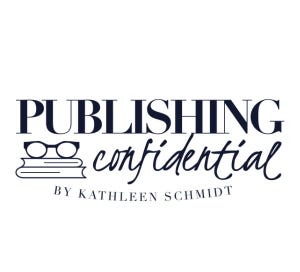PBS and NPR are Being Defunded. Where are the Publishers?
The book publishing industry has long relied on public media for book promotion. Why haven't they made public statements about its defunding?
Note: Book Therapy is on hiatus this week because I will be away for the weekend!
While most of us were sleeping, the Senate narrowly approved $9B in cuts to foreign aid and public broadcasting. There were some concessions made for foreign aid, but no such luck for public broadcasting. From The Washington Post:
The bill would slash $1.1 billion from the Corporation for Public Broadcasting, which funds PBS and NPR. Democrats have warned that the cuts will devastate local stations — especially in rural areas — that depend much more on federal funding than NPR or PBS themselves. A last-ditch amendment from Murkowski and Collins to undo most of the public broadcasting cuts failed Thursday morning.
Throughout my years in book publishing, public radio has been the crown jewel of media for literary fiction and a great deal of nonfiction. There’s Northeast Public Radio’s terrific show “Roundtable,” WBUR’s “On Point,” Minnesota Public Radio’s “The Thread,” WAMU’s “1A,” and WNYC’s “The Brian Lehrer Show” among others. If local public broadcasting is going to lose its funding, there will be even fewer outlets to pitch author interviews than there are now. Why is the book industry silent?
As you’re probably aware, several publishers have conservative imprints. There’s Broadside at HarperCollins, Basic Liberty and Center Street at Hachette, Sentinel at Penguin Random House, and Threshold Editions at Simon & Schuster. There are others, but these are the major ones at the Big Five. At the same time, each of the publishers I mentioned has imprints that publish literary books and nonfiction without a conservative slant. What troubles me is the idea that big publishers might remain silent about the defunding of public media because they need to acquire conservative books. I say “need” because historically, conservative books sell better than books that are left-leaning.
I’m not someone who would say the industry should stop publishing opposing political viewpoints. Still, I’m someone who thinks publishers need to be vocal about what this administration is doing to the media, especially public media. Sit in a marketing and sales meeting at any Big Five publisher, and you will be asked what’s happening with NPR for a book. Create publicity plans for specific books, and you must include local NPR affiliates to pitch for interviews. That becomes more difficult when stations like KQED in San Francisco are laying off 15% of their staff due to budget cuts.
Publishers can’t ignore the stronghold of the current administration on the media. The networks that have settlements with Trump include CBS, which wants its merger with Skydance so severely that it sold out an entire network for $16 million, and ABC News, which will pay $15 million towards Trump’s presidential library. From Variety:
The decisions by Paramount and Disney to wave the white flag in the face of Trump’s legal assault, though, have puzzled some First Amendment attorneys. “To be blunt, I’m surprised to see settlements,” says Rob Rickner, a New York attorney who has represented clients in free-speech cases. He speculates that Disney and Paramount settled with Trump to avoid potentially embarrassing revelations in the discovery process or to eliminate the risk of an unfavorable decision.
The problem with the settlements, according to Rickner, is that they establish an expectation that these are cases where it’s reasonable to pay some sum to settle. And that will only encourage Trump to continue pursuing such legal action. “Trump’s a bully,” Rickner says. “The only meaningful way to stop what’s going on is for the media companies to fight it out — and when they win, tell the world they won.”
The media ecosystem is essential to book publishing. Without it, book coverage would suffer more than it already has. When media conglomerates “kiss the ring,” so to speak, publishers should worry. When the Senate majority votes to defund public media, publishers should worry. Yet, I haven’t seen a single opinion piece by a publisher that castigates the damage this administration’s stronghold on the media can do to books. Granted, some publishers have stepped up and are suing states like Florida, Idaho, and Iowa over banned books, but they must do more.
I can’t pretend to have the right solution, but would it be so hard for publishers to band together to create a fund for public broadcasting? Is it crazy to think a CEO from the Big Five should write a strongly worded opinion piece on how important public broadcasting is to books?
It’s easy for some to think that book publishing needs TikTok more than it needs public broadcasting, but that’s simply untrue. NPR and NPR affiliate shows enable authors to participate in in-depth interviews, allowing them to connect with readers. Allowing this administration to defund the very media—without a fight—that helps you continue to publish books is something publishers must think long and hard about. In the meantime, I’ll be making some donations.
END NOTES:
What I’m Reading: I just started
’s new book, Everyone Is Lying to You. It’s a great summer read.What I’m Listening To: This R&B mix on Spotify.
What I’m Watching: This is what I’m going to watch. Trainwreck: Balloon Boy on Netflix. Bless those simple Twitter days.
Question:
Thanks to everyone who attended the author branding class yesterday. It was the biggest class I’ve taught so far!
What other classes would you like me to create? Let me know in the comments!




Publicity is already so hard. As a micropress, we've only gotten on national NPR once, for CHICANO FRANKENSTEIN by Daniel A. Olivas, but local radio has been part of our strategy for every outreach campaign. I appreciate your threading the pieces together and considering the conservative imprints as a possible reason for silence. Oof.
A fascinating and disturbing detail that more conservative titles sell better than left-leaning...